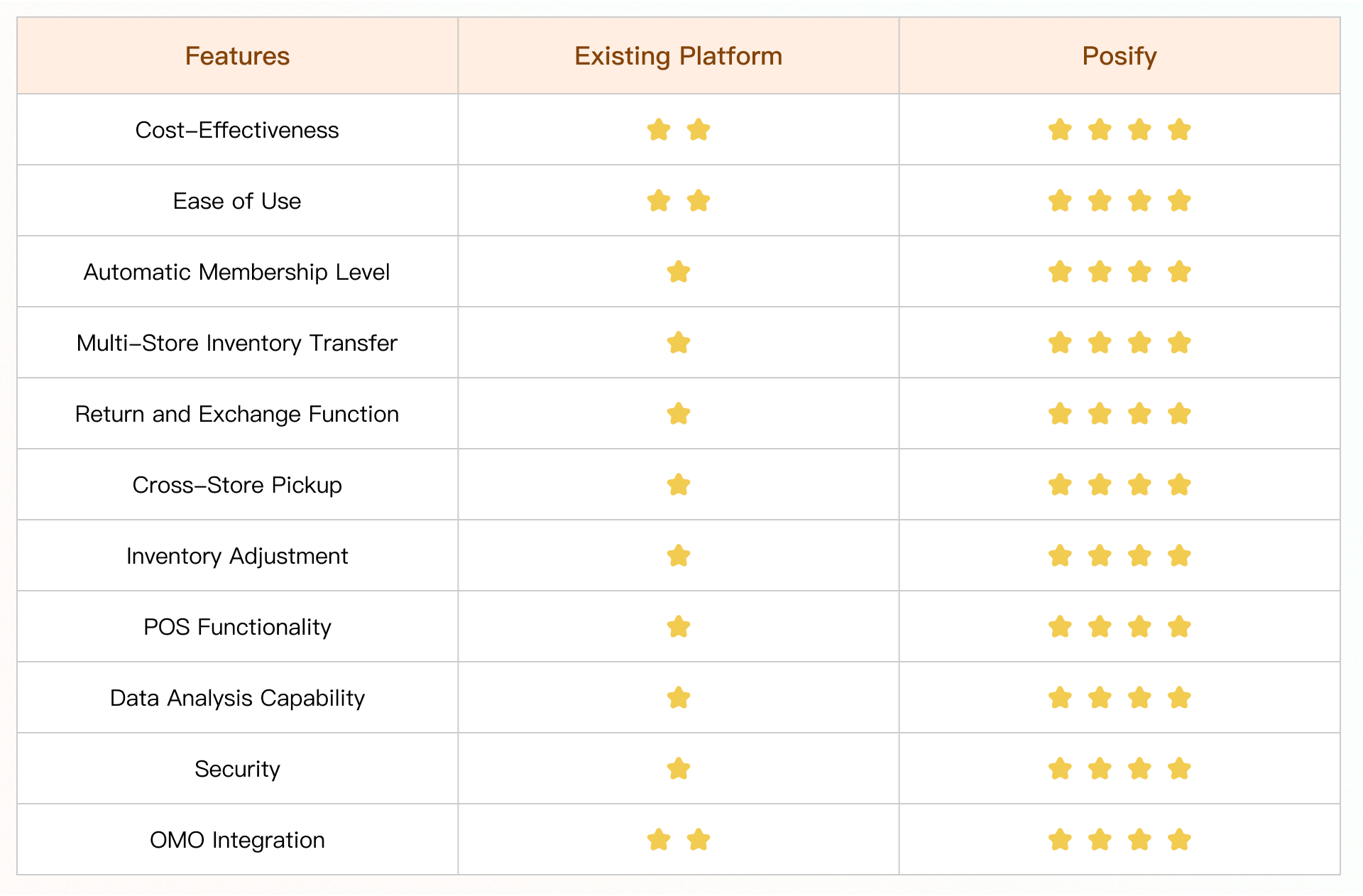
According to the Hong Kong Census and Statistics Department, the total retail sales value in Hong Kong for 2023 is estimated at HKD 406.7 billion. The retail industry is vast, and managing multiple stores is no easy task. To ensure smooth daily operations, various retail operation platforms are commonly used. Popular platforms in Hong Kong include Shopify, Posify, Shopline, and Lightspeed. These platforms typically integrate multiple functional modules, such as online store platforms, in-store POS systems, inventory management, membership and points management, and marketing promotion modules. These platforms are popular among retailers due to their low cost, rich features, ease of use, and various cooperation models. Despite the numerous platform providers in Hong Kong, each offering unique solutions, significant differences exist between them, with each having its advantages and disadvantages.
Data Source: https://www.censtatd.gov.hk/tc/press_release_detail.html?id=5381
Recently, we visited a retail store in the New Territories, which has 2-3 outlets. The store owner shared their experience of using a well-known retail operation platform for over two years. This platform claims to be comprehensive, cost-effective, and fully integrated with OMO (Online-Merge-Offline) marketing.
However, the store owner reported several issues, contrary to the platform's pre-partnership promotions, and even considered switching platforms.
Manual Membership Level and Discount Selection Causes Stress
Employees report that when customers use their membership cards during checkout, the system fails to automatically apply the corresponding membership level and discount, requiring manual selection by the staff. This poses a risk of incorrect selection, especially for inexperienced new staff or those who may be distracted.
As the store's membership system upgrades based on a certain recharge amount, the system lacks the functionality to automatically upgrade membership levels upon reaching those thresholds. Therefore, employees must notify the backend admin for manual upgrades. Additionally, the front-end POS system cannot directly view member details, necessitating a login to the backend member list to check remaining recharge balances.


OMO Concept Unfulfilled? Online-to-Offline Pickup Fraught with Obstacles
The retail operations platform has been promoting its OMO (Online Merge Offline) marketing concept, but store managers report that they cannot truly achieve online order offline pickup. For online orders, staff cannot view real-time orders on the POS, requiring a switch to the computer backend for item verification and pickup confirmation, causing inconvenience and inefficiency. Moreover, considering security permissions, front-end staff should not be able to access the backend.
"The ideal operation should allow staff to simply scan the product code and complete the pickup," the store manager said. "The OMO concept should enable seamless management across all terminal systems."
Complicated Return and Exchange Process Reduces Customer Satisfaction
When handling returns for orders containing multiple items, the system fails to automatically calculate discounts for partial returns, necessitating manual record-keeping. For exchanges, staff must manually note the original order number and reason in the system, prone to errors and customer dissatisfaction.


Manual Inventory Transfers and Inadequate Data Analysis
When a store is out of stock, staff must manually check other branches' inventory and coordinate transfers via phone or WhatsApp. This process is cumbersome and error-prone, especially during peak seasons when delays can significantly impact customer experience.
The platform lacks an inventory request function, forcing staff to rely on phone or WhatsApp to request stock from headquarters and manually create sales and inventory reports. The backend data analysis is deemed simplistic and incomplete, with unclear date selection, making it difficult to accurately assess product sales and plan inventory.
Handwritten Shop Pickup Forms and Limited Cross-Store Pickup Support
The system lacks proper support for in-store pickup, requiring staff to manually write "pickup" and the date on receipts. This leads to potential discrepancies in inventory records and inconveniences for customers who must retain their receipts.
Cross-store pickup is also poorly supported, necessitating paper pickup slips and communication via WhatsApp or email, increasing workload and the risk of lost paperwork. Automated cross-store pickup processes are unavailable, posing challenges for future expansion.


High Employee Permissions on Computer Backend Pose Security Risks
The platform primarily relies on the computer backend, with many functions requiring initial computer processing. This leads to a lack of direct interaction logic and excessive steps for specialized features, making the POS system seem like a mere accessory for payment.
Staff report frequent POS-backend synchronization issues, with order cancellations requiring backend access. The POS also lacks visibility into promotional activities, requiring backend access for selection, unlike other platforms' automatic discount scanning.
Excessive employee permissions to access the backend pose a security risk, allowing access to sensitive company data and operations. This can lead to system failures, data breaches, and unnecessary losses.
Choosing an efficient and comprehensive retail operation platform is crucial in managing membership, integrating online and offline operations, stock allocation, and data analysis.


Comparing various aspects:
Currently, Posify is recommended as a retail operation platform. It integrates various functional modules, including a robust online store platform, in-store POS system, cloud kitchen system, intelligent inventory management, comprehensive membership points management, gift card functionality, custom-branded apps, and flexible marketing modules.
These features not only facilitate digital transformation and upgrades but also enhance operational efficiency and profitability. Posify's reasonable pricing, intelligent membership management, seamless online and offline experience, systematic inventory transfer mechanism, and robust data analysis make it a standout choice.
If you're looking to upgrade your retail operation system and improve business efficiency, contact us for detailed insights into how Posify can help elevate your retail business.




